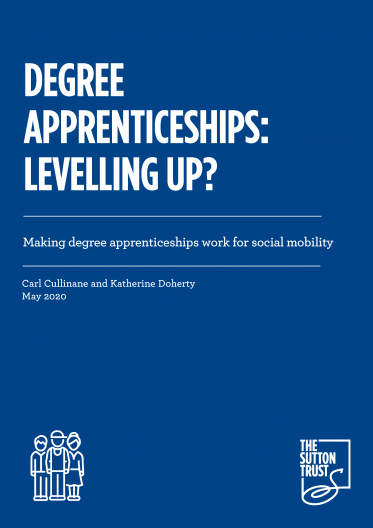Levy
1) Degree level apprenticeships (level 6 and 7) should continue to be within the scope of Levy funding, but in order to justify their cost, they need to show that they are genuinely levelling up skills for those who need it most. There needs to be a re-focusing of the degree apprenticeship programme on creating high quality new opportunities for young people, as well as older age groups who would benefit from upskilling.
2) The government review of the senior leadership standard has been welcome. To tackle the wider issue, the government should consider introducing a maximum salary ceiling for levy funded apprentices, meaning that limited public funding is concentrated on providing opportunities for those who would benefit most.
3) In order for apprenticeships to deliver on the levelling up agenda, social mobility and widening opportunity should be an explicit criterion in a review of the apprenticeships levy. The balance of apprenticeships across age groups, levels, those with equivalent qualifications and existing staff versus new starters should be examined. Measures should be taken, for instance, requiring employers to ‘top up’ levy funding for certain categories of apprentice, or otherwise incentivising apprenticeships most conducive to increasing opportunities for groups who need it most.
4) To improve transparency and ensure that apprenticeships are delivering for social mobility, levy employers should be required to publish anonymised statistics on the age, level, socio-economic background and salary level of apprentices, along with the proportion of new and existing staff benefiting from apprenticeships.
Access
1) There should be a focus on improving access for young people from disadvantaged backgrounds to the best apprenticeships. A culture of widening participation should be cultivated, similar to that around access to university.
2) Employers and universities should operate contextual admissions for degree apprenticeships, recognizing the differing challenges faced by young people during their schooling and the untapped potential of many young people from poorer homes.
3) The spending of levy money on access activities should be both permitted and promoted, including bursaries, outreach, recruitment, travel for disadvantaged apprentices or basic skills provision. This could be ringfenced, or employers encouraged to spend a certain proportion of their levy on access.
4) Widening participation statistics for higher and degree apprenticeships should be regularly published by the Department for Education, including free school meals eligibility for young apprentices, and broken down by level.
Information, advice and guidance
1) There should be a national portal where young people can easily find information about, and apply to, apprenticeships, to address the fragmented applications process and increase parity of esteem with academic routes.
2) Schools should be supported to provide good quality careers advice on apprenticeships as an alternative to university. The information gap among schools and teachers should be addressed, with better access to Information and resources. Employers should proactively work with schools to provide opportunities to gain understanding of apprenticeship routes.
